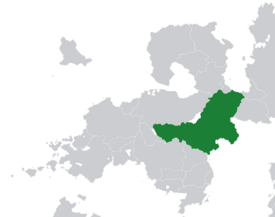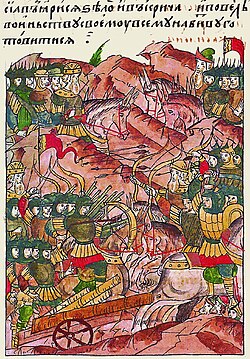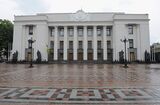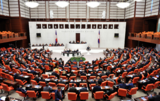Luepola: Difference between revisions
No edit summary |
No edit summary |
||
| Line 150: | Line 150: | ||
The People's Republic of Luepola was officially declared by Lev Gincburg after likely illegitimately winning his re-election as the President of Luepola. The declaration was followed by the relatively quick and violent transformation of Luepola into a one-party socialist state. The Communist Party used its stranglehold over the country to eliminate political opponents and dissidents, hasten Luepola's relatively slow industrialization, reform the Luepolan language and script, and export its ideology to other nations. Countries such as Vorochia, Granzery, Poicary and Apelia fell sway to communism throughout the first half of the 20th century. Luepola transformed its colonial holdings in Oridia and Tusola into socialist republics, but effectively maintained a stranglehold on their state affairs. | The People's Republic of Luepola was officially declared by Lev Gincburg after likely illegitimately winning his re-election as the President of Luepola. The declaration was followed by the relatively quick and violent transformation of Luepola into a one-party socialist state. The Communist Party used its stranglehold over the country to eliminate political opponents and dissidents, hasten Luepola's relatively slow industrialization, reform the Luepolan language and script, and export its ideology to other nations. Countries such as Vorochia, Granzery, Poicary and Apelia fell sway to communism throughout the first half of the 20th century. Luepola transformed its colonial holdings in Oridia and Tusola into socialist republics, but effectively maintained a stranglehold on their state affairs. | ||
On 8 April 1942, [[Invasion of Zacotia|invasion of Zacotia]] in order to install a Communist government. Vierzland and Savland each declared war on Luepola in turn, beginning the [[Great War (Vasarden)|Great War]]. After a poorly-prepared Vierz invasion of Luepola failed, Luepola went on the offensive, bringing Apelia and Granzery into the war as members of the [[Socialist International Coalition]] and besieging Vierzland on all of its land borders while also invading southern Patyria, annexing the region alongside Granzery and similarly laying siege to Cestros. Intermittent Coalition air raids on Vierzland escalated into full-scale [[Strategic Bombing in the Great War (Vasarden)|strategic]] and {{wp|terror bombing}} campaigns which were later reciprocated by the [[Allianz (Vasarden)|Allied nations]]; one of the most notable such air raids was the [[Bombing of Talheim]], in which the use of {{wp|chemical weapons}} killed tens of thousands in the deadliest week of the war. Shortly after, the Luepolans initiated the [[Battle of Kasenberg]], the largest single battle of the war. Nonetheless, Luepola's efforts at overrunning Vierzland's and Cestros's defensive lines were unsuccessful, and the entry of [[Vonzumier]] into the war placed increased pressure on Luepola's southern front and forcing her to defend her colonial holdings. Decisive defeats inflicted on Luepola at Kasenberg, [[Battle of Tarphos|Tarphos]], and the [[Battle of the Verakoni Gap|Verakoni Gap]] forced Luepola on the defensive, but Luepola was nonetheless able to maintain its own defensive line close within its pre-war borders until fall 1947, when the Allied [[Operation Rapture]] forced Apelia's surrender. In the final six months of the war, Luepola found itself overwhelmed as Vonzumier and Vierzland mounted a final offensive against Luepola. After the death of Marusić, acting Chairman [[Saňin Mlakar]] ordered the surreder of Luepola to the Vierz army, effectively ending the war. The [[Treaty of Adtrus]] would later dissolve the Luepolan communist government, place Luepola's satellite republics in Oridia under Vierz administration, and subject Luepola to military occupation by Vierzland. | |||
===Vierz Occupation and the State of Luepola (1948-1976)=== | ===Vierz Occupation and the State of Luepola (1948-1976)=== | ||
Revision as of 04:40, 2 April 2020
This article is incomplete because it is pending further input from participants, or it is a work-in-progress by one author. Please comment on this article's talk page to share your input, comments and questions. Note: To contribute to this article, you may need to seek help from the author(s) of this page. |
Republic of Luepola Respublika Ľupolska | |
|---|---|
| Motto: Narod i Sloboda Naviek Nation and Freedom Forever | |
| Anthem: Marš Lémanki March of the Lémanites | |
Location of Luepola | |
| Capital | Prishek |
| Largest city | Voitz |
| Official languages | Luepolan |
| Recognised regional languages | |
| Ethnic groups (2018) | Luepolan Molves 82% Non-Luepolan Molves 12% Njataris 3% Vierz 2% Other 1% |
| Religion | Orthodoxy |
| Demonym(s) | Luepolan |
| Government | Federal semi-presidential republic |
• President | Savo Grigorević |
• Vice President | Anastasi Obrádović |
• Prime Minister | Radovan Kozić |
| Legislature | Sliet |
| Great Assembly Veliki Sbor | |
| Popular Assembly Ľudovi Sbor | |
| Establishment | |
• Unification of Varadna and Strentland | 4 August 1329 |
| 10 July 1390 | |
| 13 March 1979 | |
• Official Establishment | 1 January 1981 |
| 8 July 1985 | |
| Area | |
• Total | 821,700 km2 (317,300 sq mi) |
| Population | |
• 2019 estimate | 79,406,594 |
• Density | 96.6/km2 (250.2/sq mi) |
| GDP (PPP) | 2019 estimate |
• Total | $2,185,348,873,474 (2.1 trillion) |
• Per capita | $27,521 |
| GDP (nominal) | 2019 estimate |
• Total | $1,798,559,354,100 (1.8 trillion) |
• Per capita | $22,650 |
| Gini | 29.1 low |
| HDI | 0.845 very high |
| Currency | Luepolan Grivna (Ғ) (LG) |
| Time zone | UTC+2 |
| Date format | dd.mm.yyyy |
| Driving side | right |
| Calling code | +52 |
| Internet TLD | .lu |
Luepola, officially the Republic of Luepola (Luepolan: Respublika Ľupolska), is a federal parliamentary republic located in eastern Patyria. It is divided into thirteen voblasti (states) and two federal municipalities. Luepola covers a total of 821,700 square kilometers, making it the largest nation in Patyria, and has a population of 79,406,594, making it the second most populous nation in Patyria after Vierzland. Luepola's capital is Prishek, and its largest city is Voitz. Other notable Luepolan cities include Rostva, Pomorna, Hrdovna, Zvin, Grast, and Utrna.
Luepola is bordered to the north by Vyzinia, Plosenia, and the Gulf of St. Jan; to the east by Tanavia, Vorochia, and the Oriental Sea; to the south by Zacotia and Granzery; and to the west by Lairea and Vierzland.
History
Prehistory
Pre-Unification (until 1329)
Varadna-Strentland and the founding of Luepola (1329-1390)
The Kingdom of Luepola, then known as Varadna-Strentland, was established in 1329 by Genadi I of Strentland. Genadi's wife Vladislava I was the heir apparent to the throne of Varadna; upon her coronation, their son became the heir to both thrones, and Vladislava opted to instead cede control of Varadna to Genadi, unifying the two countries ahead of schedule.
A period of turmoil followed, as the newly unified country was torn into civil war by the two separate houses of nobility backing different successors following the death of Genadi the Lesser. Princess Cvieta I, the preferred heir by the Varadian nobility, emerged victorious from the war. Shortly after the end of the war, neighboring kingdoms Plosenia and Zacotia invaded Varadna-Strentland, initiating the Containment Wars, in which Varadna-Strentland allied Vyzinia to retake its territory and eventually partition Plosenia and annex significant parts of Zacotia. The victory was followed by the declaration of the Kingdom of Luepola as the successor to Varadna-Strentland.
Kingdom of Luepola (1390-1818)
First Luepolan Republic (1818-1901)
People's Republic of Luepola (1901-1948)
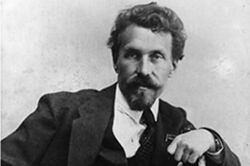
The People's Republic of Luepola was officially declared by Lev Gincburg after likely illegitimately winning his re-election as the President of Luepola. The declaration was followed by the relatively quick and violent transformation of Luepola into a one-party socialist state. The Communist Party used its stranglehold over the country to eliminate political opponents and dissidents, hasten Luepola's relatively slow industrialization, reform the Luepolan language and script, and export its ideology to other nations. Countries such as Vorochia, Granzery, Poicary and Apelia fell sway to communism throughout the first half of the 20th century. Luepola transformed its colonial holdings in Oridia and Tusola into socialist republics, but effectively maintained a stranglehold on their state affairs.
On 8 April 1942, invasion of Zacotia in order to install a Communist government. Vierzland and Savland each declared war on Luepola in turn, beginning the Great War. After a poorly-prepared Vierz invasion of Luepola failed, Luepola went on the offensive, bringing Apelia and Granzery into the war as members of the Socialist International Coalition and besieging Vierzland on all of its land borders while also invading southern Patyria, annexing the region alongside Granzery and similarly laying siege to Cestros. Intermittent Coalition air raids on Vierzland escalated into full-scale strategic and terror bombing campaigns which were later reciprocated by the Allied nations; one of the most notable such air raids was the Bombing of Talheim, in which the use of chemical weapons killed tens of thousands in the deadliest week of the war. Shortly after, the Luepolans initiated the Battle of Kasenberg, the largest single battle of the war. Nonetheless, Luepola's efforts at overrunning Vierzland's and Cestros's defensive lines were unsuccessful, and the entry of Vonzumier into the war placed increased pressure on Luepola's southern front and forcing her to defend her colonial holdings. Decisive defeats inflicted on Luepola at Kasenberg, Tarphos, and the Verakoni Gap forced Luepola on the defensive, but Luepola was nonetheless able to maintain its own defensive line close within its pre-war borders until fall 1947, when the Allied Operation Rapture forced Apelia's surrender. In the final six months of the war, Luepola found itself overwhelmed as Vonzumier and Vierzland mounted a final offensive against Luepola. After the death of Marusić, acting Chairman Saňin Mlakar ordered the surreder of Luepola to the Vierz army, effectively ending the war. The Treaty of Adtrus would later dissolve the Luepolan communist government, place Luepola's satellite republics in Oridia under Vierz administration, and subject Luepola to military occupation by Vierzland.
Vierz Occupation and the State of Luepola (1948-1976)
Luepolan War (1979-1985)
Second Republic of Luepola (1985-Present)
Geography
Luepola is a relatively large country, covering 821,700 square kilometers and securing its position as the largest country in Patyria, followed by neighboring Vierzland. Luepola has a largely temperate climate overall, though the southern coastal regions of the country receive quite warm temperatures, and the mountainous western and northern stretches of the country experiencing a cold, alpine climate for much of the year.
Demographics
| Largest cities of Luepola (2019 census) | |||||||||
|---|---|---|---|---|---|---|---|---|---|
| City | Population | State | City | Population | State | ||||
| 1 | Voitz | 2,364,964 | Občina Vojc | 11 | Bráznica | 595,788 | Aneska | ||
| 2 | Rostva | 1,512,376 | Jutska | 12 | Elenevo | 581,393 | Jutska | ||
| 3 | Prishek | 948,083 | Hautbecirk | 13 | Čakajec | 560,848 | Bružka | ||
| 4 | Zvin | 713,555 | Varadna | 14 | Aneska | 557,854 | Aneska | ||
| 5 | Grast | 704,721 | Trnava | 15 | Voľana | 547,967 | Varadna | ||
| 6 | Kořevac | 687,397 | Trnava | 16 | Nediňe | 539,901 | Bosunija | ||
| 7 | Bosaňe | 664,919 | Dvolăn | 17 | Mlaževo | 500,608 | Varadna | ||
| 8 | Hrdovna | 655,083 | Sevierna | 18 | Đalan | 488,226 | Nimorăn | ||
| 9 | Utrna | 644,323 | Bosunija | 19 | Judusa | 472,475 | Bosunija | ||
| 10 | Pomorna | 638,575 | Jutska | 20 | Obránse | 470,273 | Cărnipoře | ||
Ethnic Groups
Religion
Christianity is the dominant religion in Luepola, encompassing 77% of the population. Of this, 14% professed to be Catholics, whereas the other 86% professed to be Orthodox.
Approximately 15% of Luepolans claim to be Atheist or Agnostic, or otherwise irreligious.
About 4% of Luepolans profess Islam as their religion. Of these, 80% claim to be Sunni Muslims, with Shi'ites and Sufis encompassing the remaining 20%
3% of Luepolans claim to be followers of another religion. Noteworthy religions in this category include Judaism, Hinduism, and Buddhism.
Government

The Luepolan government consists of three branches: the Sliet, which is the legislative body of Luepola, and the branch which the Prime Minister is formally a member of; the Executive branch, which is composed of the President, Vice President, cabinet, and most government agencies; and the Luepolan High Court, which is the highest judiciary body in the nation.
The Executive Branch consists of the President, who is elected by popular vote in a runoff election. The President is the Head of State of the nation. The President appoints personal advisors to his cabinet, who function as the heads of the various government agencies. The President is the ceremonial Commander-in-Chief of the Armed Forces, but may formally advise his military staff if he is militarily experienced, following the precedent set in the Luepolan War by Emil Ivanušić. The President is also responsible for signing bills passed in the Sliet, or vetoing them. The President (or President-Elect) nominates his choice of Prime Minister before taking office, though in many cases a campaigning president will select his desired Prime Minister while campaigning; he is also responsible for nominating new High Court Judges to fill vacancies as they appear. The President can serve up to three four-year terms, though all presidents elected since 1985 have served for two terms at most. The incumbent president of Luepola is Savo Grigorević.
The Sliet is a bicameral legislature which oconsistsf two houses. The Popular Assembly (Ľudovi Sbor) is the lower of the two houses and consists of over six hundred representatives that represent the states based on population, who are voted into office through statewide elections concurrent with the national election. The Great Assembly (Veliki Sbor) is the upper house and consists of six representatives from each state and two from each independent municipality, who are voted into office by the representatives of the Popular Assembly. Representatives in both houses serve four-year terms and are restricted to three-term limits. The Sliet has the collective and exclusive power to propose and pass legislature, to permit or deny peace treaties, and to declare war on another nation. The Sliet also has the power to override a presidential veto on a piece of legislature with a two-thirds' majority, and to preempt a presidential veto with a three-quarters' majority. The Great Assembly in particular has the power to impeach government officials including the President and Prime minister, and to confirm a presidential nominee to the High Court; the Popular Assembly has the power to confirm a presidential nominee for Prime Minister. The leader of the majority in each chamber of the Sliet, whether of a coalition or of a single ruling party, is appointed as the Chairman of their chamber and responsible for representing their specific chamber in the presence of the President or a foreign dignitary. The incumbent chairman of the Great Assembly is Krăsto Ivanović, and the incumbent chairwoman of the Popular Assembly is Marza Baľaka.
The office of Prime Minister is an informal, traditional office that is not explicitly defined by Luepolan law, but is traditionally held accountable to both the Sliet and the President. The Prime Minister functions as the Head of Government for the Nation. He is officially a representative of his electoral region in the Popular Assembly (though his position as such is unofficially filled by an acting representative), and is responsible to the President for ensuring the regular and lawful functioning of the Sliet; unofficially, he is also a member of the President's cabinet charged with representing the body of the Sliet in the President's Cabinet meetings. The Prime Minister is, in addition, the first in line to the succession of the presidency should the President become unable to carry out his duties. The incumbent prime minister of Luepola is Radovan Kozić.
The High Court is the supreme judiciary body of the nation, and handles civil and criminal cases that have been sucessfully appealed past all regional courts. The High Court also rules on the constitutionality of a law passed by the Sliet, and is in charge of handling impeachment cases. Judges are appointed by the President and approved by the Assembly, and may serve for a maximum of thirty years, though these terms may be cut short by voluntary retirement or death. A judge can be removed prior to their term expiration through impeachment by the Popular Assembly; a special session of the Great Assembly is then convened to convict an impeached judge, or to strike down the impeachment.
Savo Grigorević, the incumbent president of Luepola.
Radovan Kozić, the incumbent prime minister of Luepola.
The Sliet building in Prishek.


